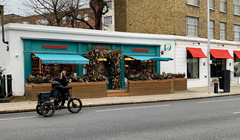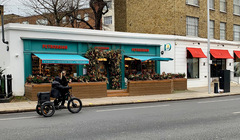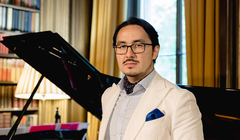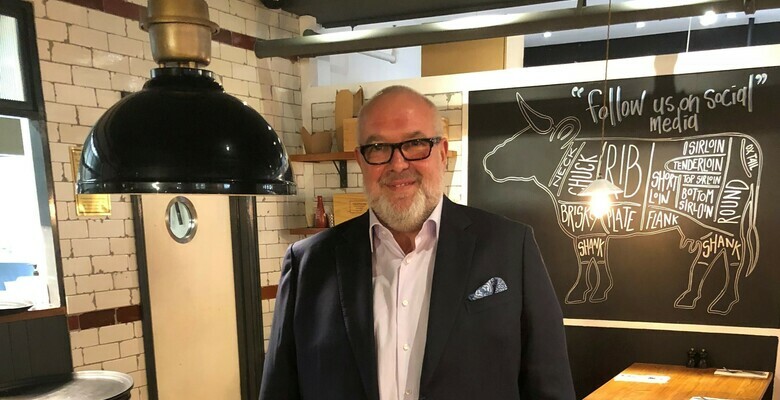
Chief Editor of Kommersant UK, Ksenia Dyakova Tinoco, met restaurant owner Roman Zelman through a common acquaintance, and became the first to interview him. Roman is the closest associate of his more outgoing brother Mikhail, who has already given dozens of interviews, if not hundreds. Roman is involved in the administrative side of the business and he prefers to keep himself in the shade, which is a shame as he is a great storyteller and a genial host.
In December we met at the Goodman restaurant in Mayfair. Despite the spread of Omicron around Britain, there are almost no free tables in the establishment. It’s very noisy, and it’s hard for us to find a place to sit for our discussion. We start with steaks. The eccentric hostess theatrically brings us a tray and shows me rib eye, fillets and sirloin. Roman orders 800 grams of meat for both of us with a side order of spinach and gruyere cheese.
I still have to meet the people who are cooking the meat, so we go down into the kitchen. Being a griller looks like a rather dangerous profession. Two men deftly wield baking trays by the oven, which is emitting such an infernal heat that even at a distance of a metre and a half, I feel like turning away. The grillers put something in there every few seconds, wait a little, flip it and then wait a little longer before taking it out again. They look at us a little grimly. Every piece of meat costs from £30 to £100, so it’s important not to get distracted and make a mistake. It’s hard work, requiring constant concentration. Roman says that if he had to stand at the grill for long he’d have a heart attack; this work is only for the tough and lean. They can still get hold of suitable workers, even after Brexit, when almost all British restaurants are experiencing staffing shortages.
Then, I’m thrown out of the heat and into the cold of the ageing room, where expensive American and British meat is hung for days. The low temperatures and Himalayan salt prevent bacterial decay, while the meat undergoes the process of fermentation; the connective proteins break down as the meat shrinks and it acquires the particular tenderness which can be savoured by Goodman diners.
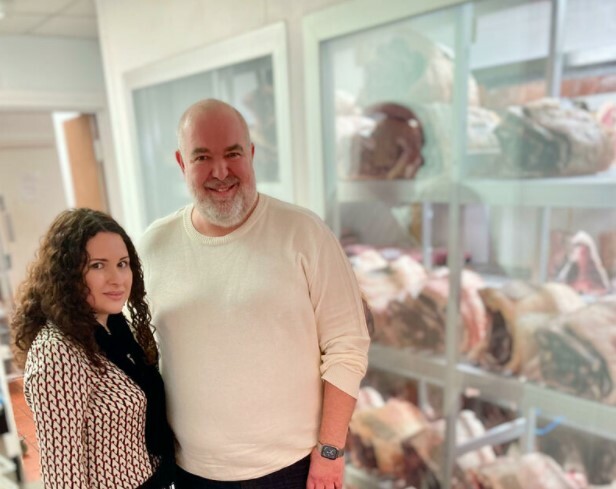
We’re ready to go back upstairs and, as we go out, Zelman thanks the chef for the best steak in his life. ‘Meat like this is better than sex’ laughs Roman. ‘Write that down for future reference. Now let’s do the interview.’
About food and love for meat
Where does your family’s love for meat come from?
The familiarity probably comes from my dad. He had an interesting life. When he finished university he started work and, quite soon, he became head of a laboratory specialising in space medicine. In 1968, shortly before the Olympics in Mexico, they had developed a device that could measure aspects of physical processes in the body remotely; things like blood pressure, pulse and breathing. It had been developed for cosmonauts, but since the Olympics were supposed to take place at a high altitude, they sent dad off to the Caucasus with the Soviet horse riding team. The people and the horses had to adapt to the high mountain conditions. The only person who wasn’t busy training was dad, so they made him responsible for feeding the team, and gave him some vouchers. Armed with these, he went off to a high mountain village, and instead of butchered meat, they gave him a whole sheep. The locals showed him how to skin it, cut it up and cook it. Dad enjoyed it. And from then on, he was into meat, he always chose it himself and bought it on the market. In our family (my brother and I grew up in Sokolniki in Moscow), we had a cult of meat, of food. Also, my dad went hungry during the war, so in our family we had a rule; we weren’t allowed to leave anything on our plates.
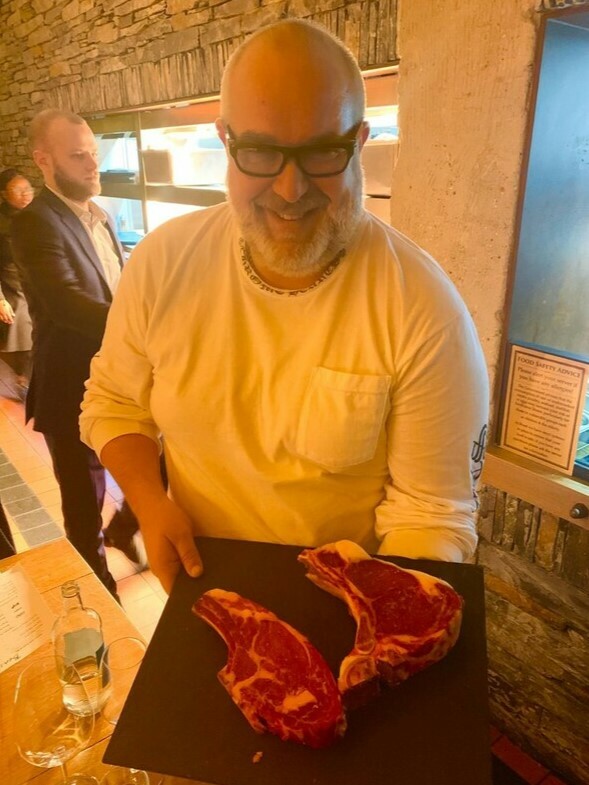
About the restaurant business
How do you open a successful restaurant in London?
You need to have a special something which is better than the competition. And you’ve got to have enough people around you who share your values. Some people think that if you open a restaurant where they serve oysters and caviar sprinkled with truffles all of that will become popular straight away. Chefs especially are keen on complicated ideas like that, although, in my opinion, a truly great chef can prepare the simplest dishes so that they make you go ‘wow’!
We used to work with two chefs, one of whom was a Chinese Malay, and the other an Italian. Although they grew up in different cultures, they’re both talented chefs who’ve achieved great things. Misha [his brother Michael] asked both of them to make chicken stock. Each made it very differently; one with a distinctive exotic taste and an Asian presentation, and the other with a pronounced taste of chicken. Both were delicious. But no matter how much caviar you put onto shit, it still doesn’t stop being shit. Often people get caught up in devising elaborations for their own sake. You ask them why and they answer ‘because no-one’s ever done it this way before’, and you want to ask them ‘haven’t you thought that maybe nobody’s done that before because no-one wants it?’. On the other hand, this question never occurs to creative people. They have to make their own mistakes.
Misha has set a trend twice. The first time was the steaks at Goodman. He didn’t invent them, but before him, in Russia any piece of fried meat was called a steak. And when he opened Goodman, he set a benchmark for a quality steak. People started to say ‘I was at a restaurant last night, I tried the steak and it wasn’t great, you can’t compare it to Goodman’. Or they’d say ‘I tried the steak, it was like at Goodman, but more expensive. The second trend was opening the first Burger&Lobster, a restaurant that focused on preparing only two main ingredients.
But behind every visionary there is a team which supports them, criticises them and puts in hard work; no-one can put together the whole system, not even the greatest visionary can do that.
Can someone with a head for business who is either indifferent to food or a dieting enthusiast become a successful restaurateur?
That’s debatable, but it seems to me that if you don’t like what you’re doing, you won’t be able to succeed in it and become outstanding. To do that, you have to be a fanatic. Success is all about personality. When you’re really absorbed by your work, you don’t feel pain, tiredness or hunger!
Why has Russian cooking still not conquered the world? Aren’t there enough decent chefs?
There are enough. But, first of all, Russian cooking isn’t too original, it’s just this collection of recipes of the different peoples of the Russian empire. There are lots of good dishes which seem strange or difficult to the Western palette. How can we explain to them what buckwheat is? Europeans can’t even imagine that you can eat it. My friends in Britain organised a project and baked pies and cakes and made zefir [a Russian marshmallow variant] following Russian recipes. They turned out well, and when they offered them to the English, they really liked them. It’s a small family business which is quietly growing from year to year. But all in all it’s difficult to explain many aspects of our cooking to foreigners. For example, people travel to Italy, and you don’t need to explain to them what Italian cooking is, because in Europe everything is mixed together and everyone knows each other’s cooking. But Russia is by herself, off somewhere to the side.
All the same Chinese cooking is well known all over the West
There has been massive Chinese expansion. Compare how many Russians live abroad and the number of Chinese who have settled all over the world. In every world capital there is a Chinatown. You have to understand that food isn’t just about fulfilling a bodily need; it’s a sociocultural phenomenon. For example, many people don’t even think about what plov is [an Uzbek rice dish akin to pilaf]. My favourite cooking happens to be Uzbek. I tried it for the first time at my friend’s house; he’s from Tashkent and his mum cooked it. At their house I ate real lagman [a noodle dish] and plov made with lamb tail fat. How can you explain to the English what tailfat is? In Russia, many people who haven’t already tried it say ‘yuck, I’m not having any lamb’ But can you make real plov any other way? In the world there is very little authentic cuisine. People don’t think about how plov developed, it seems to them that it’s the same as Indian spicy chicken rice or paella, but the recipe for Plov came about in the time of Genghis Khan, when they had to feed a huge army and the baggage train with the provisions just couldn’t keep up with the fast-moving horde. That’s why they had to have foods that, whilst being light and easy to transport, were sustaining and high in calories. What could be simpler than a sack of rice and spices tied to the saddle with a piece of mutton stuck under it? The warriors rode sitting on it, which made the meat even tenderer. They could find vegetables where they broke camp. The soldiers took their shields (the prototype of the later plov pots), put them on the campfire and easily cooked a hearty and tasty dish. The warriors ate, and then they went off to conquer the world some more. But this story needs to be told, people don’t know it…
Previously in Russia you helped to develop the culture of steak dining, but now, in the West, there are many activists who campaign against eating meat at all. I’ve heard that the British government plans to impose taxes on the sale of meat and meat based dishes. How do you feel about that?
Humanity is a huge society made up of a great number of different minorities. As a meat-eater, forcing people to renounce meat seems terrible to me. I see that as an invasion of my personal space; discrimination against me as an individual. At the same time, a vegan considers the consumption of meat to be cannibalism. Everyone has a right to their own point of view. Ideally there should be a balance. On the one hand, they’ve now started to synthesise meat out of vegetable protein, although for now it’s more expensive than natural meat. I’ve tried it and I didn’t like it. But progress goes on. I fully concede that at some point, artificial meat may be both cheaper and no worse tasting than natural meat. When I eat animal protein, I don’t do it because I enjoy killing animals. I think a complete rejection of meat is unhealthy in the long term. I’ve talked to nutritionists, and they say you need a bit of everything in your diet. You may be surprised, but many years ago my wife stopped eating meat, not out of principle or health reasons, but just because she didn’t like the taste any more. But sometimes she can eat a piece of chicken if the need arises.
About business in Britain
You’ve lived and run business in four countries. Where is best of all?
I can say that Britain provides the best conditions out of everything that I’ve seen. I really love Israel. I adore Switzerland so much that I want to go back to live there. Although at first it seems reserved and not very friendly, they accept you if you deserve their respect. It’s true that if you break any rules, they’ll tell the police all about it…In England, there’s a wonderful social scene that tries to be balanced.This is because competition is alway a balance of interests and businessmen are a minority like any other, just like ethnic groups or sexual minorities. Of course the interests of the majority are the interests of people who work for a salary. However, if you don’t take the interests of business into account, then people just lose their motivation to work. Then distortions occur, as I believe is happening now in Germany, for example. Multinational corporations, with all the resources they can put into lobbying, get the concessions that suit them, but the rest of business is either driven into some kind of shadowy semi-legality, or is forced to exist in unfavourable conditions. In this situation, business starts to look for means of compensating its losses in the form of off-shore schemes or relocation to other jurisdictions etc.
As for Russia…in Britain, your source of legitimacy is your fortune, reputation and respect; it comes from the community, whereas, in Russia it’s all the other way round. It doesn't matter where your money comes from, it’s enough to have corrupt connections, a rich relative, or any other way of getting access, either to state funds, property, or shares in a corporation. Having these connections gives you a greater advantage than good business sense and having a better product. Why bother thinking about improving efficiency, if your customers are obliged to buy from you anyway, according to the conditions of the tender they have secured with you? The cause of the problem in Russian business is an absence of competition. But what is competition? Being unique. It’s wonderful when you build a business together with unique people in a market where there are people with unique products…
The English legal environment allows us to work honestly. I recently heard about the schemes they use in Moscow to get hold of cash without declaring it, and I realised that, after being away for so many years, I’d forgotten what it’s like back there…
About the pandemic and the measures taken to support business.
During the pandemic all British restaurants closed. This didn’t even happen during the war, I believe. Was this decision justified?
At that time, in uncertain conditions, it was right. All the same, it’s not straightforward. The WHO gives all governments recommendations, which they follow. However, this organisation has shown its ineffectiveness over the last two years. It has been just plain wrong so many times, and then tried to hide the facts, whilst giving out recommendations which have led to serious losses. After which it has turned out that the advice was either not based on sound data, or had come from rather controversial expert opinion. If the WHO were a business or a financial institution, then it would have lost its reputation and its staff would have been out on their ears, unable to find new jobs. But the WHO hasn’t suffered at all.
So are politicians and intergovernmental agency staff untouchable?
As I said, in everything there must be a balance. The state’s job is to seek a balance and take decisions without hurting any minorities. This is, without doubt, a difficult balancing act. However, it's too early to say if the world as a whole has been coping well with this task during the pandemic, we won’t get a clear picture until after one or two political cycles. One thing is clear; if the state introduces restrictions but fails to support business, then we’ll see protests, and the pendulum will swing back in the other direction.
Have you adapted to the pandemic? If so, how?
When the restaurants closed last year, things were tough. Before the pandemic, it had never occurred to me to worry whether our restaurant is geared to delivery. It seemed easy; we’d got a kitchen, so we could cook food and send it off, there were courier services which came to take orders. But it turned out that there was no place in the restaurant for packing food or storing the packaging. And most of our food is prepared to be taken to the table and eaten straight away. After half an hour, steaks are just not the same as when they’re sizzling from the grill. Another thing was that during the lockdown we had a lot of good meat left over. So we put together DIY boxes; it was the team’s idea. We organised their delivery online. It wasn’t a bad solution as the boxes were popular. But that’s not the restaurant business.
Did you use the furlough programme?
Of course. Thanks to furlough we managed to keep hold of the backbone of the team, which is very important for the success of the restaurant. The key workers, the chefs themselves, have worked for us for many years; they have the key expertise. There’s always staff turnover, that’s normal. I’d say that it’s rotation; people can’t work in the same place for long or they start to degrade. Some of them leave their positions with us and go off to work in other restaurants and then they come back, but take a different role. An exchange of experience is going on; they take our expertise to other establishments and they bring new know-how to us.
About money
Why do businessmen who own successful restaurants keep opening more and more new ones? Are they motivated by the desire to see all those large sums on their bank balances? Or is it something else?
Some people believe that the source of all blessings in the Western World is your use to society. The more useful you are, the more society rewards you, with money, respect and other bonuses. Although it’s not good to brag about your net worth, when you arrive in New York, they introduce you by saying you are worth a certain sum of money. That’s a high degree of trust. But in San Francisco they don’t announce how much money you have, they say that such and such a businessman founded Uber or Apple, and that’s how they’ve influenced the fate of humanity. You don’t need billions or hundreds of millions for a comfortable life. Big money is a tool for creation. That is why, when you have an idea, experience and resources, including financial resources, the most important resource of all is your reputation. And if you have a good one, you’ll definitely find the money, however much you need, on the best or the worst conditions, that’s competition. You struggle against the competition for the recognition of society.
About the present and future
What restaurants are you running today with your brother and your team?
In all we have thirteen of our own Burger&Lobster restaurants in Britain, the US and Singapore, there are about ten more working on franchises. As well as that, we have Endo at the Rotunda, the michelin-starred Japanese restaurant and Sumi in Notting-Hill, which was opened in collaboration with the celebrity chef Endo Kazutoshi.
What catering trends have appeared in London, and what projects do you intend to develop?
One example is a family that doesn’t want to go anywhere, they want to eat in, one child chooses pasta, another a pizza, the wife wants a salad and the husband needs meat. To order all that, you need to call several different delivery companies, who aren’t likely to be able to bring it all at the same time so that the family can set the table and eat together while all the dishes are hot. Aslo, delivery works out four times more expensive. As a rule, to save money, the parents have the same thing as their children. What other options are there? Deliveroo is building a big food court (the project is called Deliveroo 2.0), which is divided into corners. There are 10 partner restaurants which cook their food directly at the site. This approach has advantages including the possibility of ordering several dishes from different cuisines at once. The project is in the final stages. A large area is required as each restaurant needs its own separate kitchen, warehouse etc.
How is it different from our new project, Neyba? We’ve divided the whole operation into sections. Each section produces a small range of dishes. The hot section, for example, is the grill, with burgers and chicken. The rice section prepares rice for curry and sushi rolls. We haven’t divided it into corners, but into different technical functions. This approach has allowed us to significantly reduce the staffing and the area required. Neyba has six menus, each with its own chef. For example, Endo Kazutoshi is in charge of the Japanese menu.
In the spring we will open yet another big project in London, which will bring aspects of our catering to the office, and make it as accessible as a cup of coffee. I won’t tell you the details just yet, but nothing like it has been done before.




